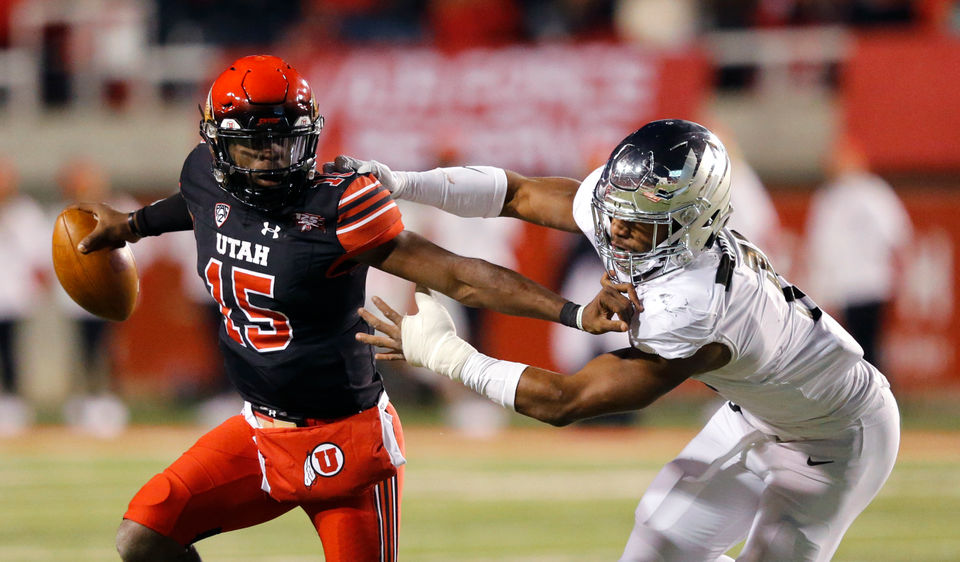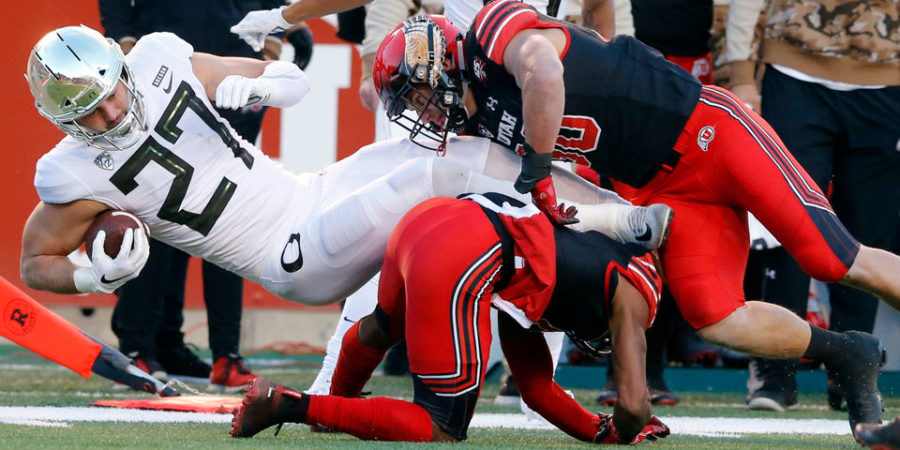There’s no two ways about it. Oregon’s 32-25 loss to Utah Saturday evening in Salt Lake City is going to be a game that sticks.
Similar to road losses to Washington State and Arizona, the Ducks got off to a slow start which found them in a 13-0 hole early. However, Oregon hung around, cobbling together a comeback that saw them take the lead roughly midway through the fourth quarter.
Yet, it would be all for naught.
Utah would respond with a quick five-play, 60-yard scoring drive that would give them the lead for good, handing the Ducks their third straight loss on the road and dropping them to 6-4 overall (3-4 in conference).
Below, WFOD digests the biggest takeaways from a game in which the Ducks demonstrated some fight, but ultimately fell victim to the same issues that have plagued this team virtually all season.
1. Slow starts on the road continue
Is it a mentality thing? Is it a play calling thing? Is it a personnel and execution thing? Whatever the reason, the Ducks have been nothing short of dismal to start their last three road games. How dismal? Simply refer to the tweet below, which includes Oregon’s first three drives versus Utah on Saturday.
Oregon’s first three drives in their last three road games
• 5 plays, 9 yd, fumble
• 3 plays, -6 yd, punt
• 3 plays, 1 yd, punt• 3 plays, 9 yd, punt
• 3 plays, 8 yd, punt
• 3 plays, 6 yd, punt• 3 plays, 1 yd, punt
• 3 plays, 18 yd, punt
• 3 plays, -7 yd, punt— Dan Rubenstein (@DanRubenstein) November 10, 2018
In fact, the Ducks managed only four yards of total offense in the first quarter. We’ll take a closer look at the offense in the sections below, but Oregon’s terrible starts offensively have set the table for the concerning play we’ve seen the past several weeks. It also remains as one of the biggest indictments of this team under the direction of head coach Mario Cristobal and offensive coordinator and primary play-caller Marcus Arroyo.
2. Stubbornness and a clear lack of skill is hamstringing this offense
The slow starts are only one part of the troubling trend we’ve seen from the Oregon offense in recent weeks. Overall, the offense has all too often fallen victim to stubborn play-calling and philosophy, not to mention a striking lack of competency from skilled position players not named Justin Herbert and Dillon Mitchell. And to be honest, it’s difficult to tell whether the lack of skill is inspiring the unimaginative offensive approach, or vice versa. Either way, for the first time in literal decades, the Ducks have serious offensive issues that likely won’t be fixed this season.
When it comes to stubbornness, look no further than Oregon’s approach on first downs versus Utah. On 28 first down attempts, the Ducks ran the ball 18 times and were forced into 3rd and long (defined as 3rd and 7 or longer) on eight of those occasions. Since the Washington game, Cristobal and company have harped on the importance of staying ahead of schedule so as to avoid 3rd and long situations. Yet, the Ducks have struggled to do just that. In fact, one could argue that the offense hasn’t operated with a consistent and effective rhythm since Oregon’s overtime loss to Stanford in late September. Instead, the Ducks have become frustratingly predictable (raise your hand if you too will be having nightmares about failed slant routes for the next few days), demonstrating little in the way of innovation or adjustment. Like it or not, this staff appears hellbent on establishing a physical identity regardless of the effectiveness (or ineffectiveness) of those efforts.
In terms of talent, it was generally known that Oregon might have some struggles this year finding skilled position players to step up following the graduation of Royce Freeman or Charles Nelson. But I’m not sure anyone could have predicted it would be this clunky. Yes, the Ducks are particularly young and inexperienced at running back and wide receiver, but the lack of development at these positions throughout the season does not inspire confidence looking ahead.

3. Oregon’s issues on defense persist despite Utah’s replacement of star players
When it was discovered that Tyler Huntley’s broken collarbone would prevent him from suiting up at quarterback for the Utes this week, Duck fans likely breathed small sigh of relief. After all, the Utes would be without one of the hottest players in the conference the past several weeks. However, when news broke that star running back Zack Moss would also miss Saturday’s game due to a season-ending knee injury suffered in practice earlier this week, optimism surrounding Oregon’s chances to win understandably rose exponentially. Perhaps the Oregon’s defense got a little caught up in those developments as well, as Utah’s replacements for Huntley and Moss operated as if they had been starters since Week 1.
In his first career start, redshirt freshman quarterback Jason Shelley was poised and efficient at the controls of the Utah offense, completing 18-of-31 passes for 262 yards while avoiding turnovers completely. And though he fell short of notching his first career touchdown pass, Shelley did find the end zone twice on the ground. Meanwhile, junior running back Armand Shyne had a career day in relief of Moss, rushing for 174 yards on 26 carries. In fact, Shyne’s rushing yards versus the Ducks eclipsed his season-long totals entering Saturday’s game (166).
Simply put, this was one of the more disheartening performances from the Oregon defense this season, which is saying something considering they’ve been routinely victimized by opponents since Pac-12 play began. The Ducks had no answer for Shelley, who was rarely under duress despite playing behind an offensive line that ranked 11th in the Pac-12 in sacks allowed this season. The same can be said for Shyne, who averaged nearly seven yards per carry (6.7, to be exact) versus Oregon after averaging just 4.49 yards per carry in nine previous games. As bad as Oregon’s offense has been, Oregon’s defense has been equally disappointing of late.
4. Oregon’s special teams continues to be a roller coaster
Like Oregon’s offense and defense this season, Oregon’s special teams has similarly enjoyed moments of brilliance mixed with moments of extreme frustration. Saturday’s loss at Utah was a microcosm of those peaks and valleys. For the second straight week, Ducks placekicker Adam Stack had trouble finding his mark from field goal range. His missed attempt from 36 yards out was part of a six-point swing in favor of Utah at the end of the first half, as the Utes took possession after the miss and marched down the field to set up a 55-yard field goal from Matt Gay. For the season, Stack is 5-of-9 on his field goal attempts.
The good news for Oregon on special teams came midway through the fourth quarter after Kano Dillon blocked a Mitch Wishnowsky punt that was recovered on the Utah three-yard line by Oregon’s Adrian Jackson. The Ducks would score on the next play to take their first lead with 8:15 left in the game.
BLOCKED!!
Oregon blocks the punt and the Ducks will have 1st-and-goal from the 3! 8:20 left in the game. Utah up 22-17. #GoDucks pic.twitter.com/rnpAwAHhq6
— Oregon Football (@oregonfootball) November 11, 2018
5. This loss is a brutal reflection of the state of Oregon football
Plain and simple, this loss is a tough one to swallow for Oregon. Not only did the Ducks fail to take advantage of a wounded opponent that was without their clear-cut two best players on offense, but they also failed to score their first meaningful win on the road since their last trip to Salt Lake City in 2016. Unlike that season, Oregon won’t finish 4-8, but this loss confirms that the Ducks still have a ways to go before they can be seriously considered a conference contender. Oregon has regressed over the second half of the regular season, and it’s not debatable. Moving forward, there are two essential questions that are left to be answered:
- Does the downward spiral continue over the final two regular season games?
- Is this disappointing downturn a product of Oregon’s lack of proven depth and talent finally catching up with them, or does it speak to a larger systemic issue that extends beyond the field of play on Saturdays?
The former will be answered in short order, while the latter won’t be determined until next year at the earliest. For now though, there will be no shortage of soul searching within the ranks of the Oregon football program in the aftermath of Saturday’s loss.

